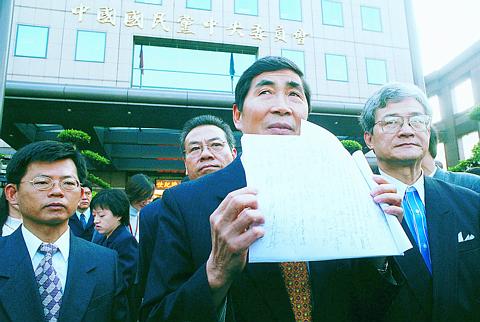DPP lawmakers yesterday accused the KMT of stealing more than US$100 million in US economic aid in the 1970s and channeling the money to its party-owned business empire.
As part of the DPP's continuing campaign to shed light on KMT assets which the opposition party alleges were obtained illegally, DPP lawmaker Cheng Pao-chin (鄭寶清), who leads a task force called the KMT Assets Reclaiming Agency, made public a finance ministry document from 1976 to support his accusation that the KMT had misappropriated aid money.
"The Bankers Trust International Limited based in the US loaned Taiwan's government US$100 million at a low interest rate -- 1.75 percent -- to be used in assisting state-run businesses," Cheng said.

PHOTO: CHIANG YING-YING, TAIPEI TIMES
"But the KMT took that money and invested it in party-run businesses, including the China Development Corp [now China Development Bank, CDB], the Broadcasting Cooperation of China [BCC], and China Airlines [CAL]," he said.
According to other documents that Cheng revealed yesterday, the KMT took US$86.1 million from the 1976 aid package -- which included the low-interest loan -- and invested it in CAL.
Some of the documents were signed off by former Minister of Finance Fei Hua (
Cheng appealed to the government to take back ownership of CAL and list it as a state-run business.
DPP lawmaker Yeh Yi-chin (
"We can see from those documents that China Development Corp had already taken about US$20 million as of Dec. 31, 1976. We want to ask whether the KMT has returned that money, and why the government has to borrow money to help the KMT's party-run businesses," Yeh said.
Meanwhile, 126 lawmakers, including 34 KMT legislators, 68 from the DPP, 10 from the New Party, and 13 independents, signed a petition demanding that the KMT make public its assets before the March presidential election.
DPP lawmaker Trong Chai (
"Especially those assets taken from the Japanese government after Japan ended its rule over Taiwan should be returned to the people," Chai said.
KMT lawmaker and party official Chen Hung-chi (
"We certainly plan to make public our assets. And we will accomplish it as soon as possible because we do underestimate people's expectations," Chen said.

Right-wing political scientist Laura Fernandez on Sunday won Costa Rica’s presidential election by a landslide, after promising to crack down on rising violence linked to the cocaine trade. Fernandez’s nearest rival, economist Alvaro Ramos, conceded defeat as results showed the ruling party far exceeding the threshold of 40 percent needed to avoid a runoff. With 94 percent of polling stations counted, the political heir of outgoing Costa Rican President Rodrigo Chaves had captured 48.3 percent of the vote compared with Ramos’ 33.4 percent, the Supreme Electoral Tribunal said. As soon as the first results were announced, members of Fernandez’s Sovereign People’s Party

MORE RESPONSIBILITY: Draftees would be expected to fight alongside professional soldiers, likely requiring the transformation of some training brigades into combat units The armed forces are to start incorporating new conscripts into combined arms brigades this year to enhance combat readiness, the Executive Yuan’s latest policy report said. The new policy would affect Taiwanese men entering the military for their compulsory service, which was extended to one year under reforms by then-president Tsai Ing-wen (蔡英文) in 2022. The conscripts would be trained to operate machine guns, uncrewed aerial vehicles, anti-tank guided missile launchers and Stinger air defense systems, the report said, adding that the basic training would be lengthened to eight weeks. After basic training, conscripts would be sorted into infantry battalions that would take

GROWING AMBITIONS: The scale and tempo of the operations show that the Strait has become the core theater for China to expand its security interests, the report said Chinese military aircraft incursions around Taiwan have surged nearly 15-fold over the past five years, according to a report released yesterday by the Democratic Progressive Party’s (DPP) Department of China Affairs. Sorties in the Taiwan Strait were previously irregular, totaling 380 in 2020, but have since evolved into routine operations, the report showed. “This demonstrates that the Taiwan Strait has become both the starting point and testing ground for Beijing’s expansionist ambitions,” it said. Driven by military expansionism, China is systematically pursuing actions aimed at altering the regional “status quo,” the department said, adding that Taiwan represents the most critical link in China’s

EMERGING FIELDS: The Chinese president said that the two countries would explore cooperation in green technology, the digital economy and artificial intelligence Chinese President Xi Jinping (習近平) yesterday called for an “equal and orderly multipolar world” in the face of “unilateral bullying,” in an apparent jab at the US. Xi was speaking during talks in Beijing with Uruguayan President Yamandu Orsi, the first South American leader to visit China since US special forces captured then-Venezuelan president Nicolas Maduro last month — an operation that Beijing condemned as a violation of sovereignty. Orsi follows a slew of leaders to have visited China seeking to boost ties with the world’s second-largest economy to hedge against US President Donald Trump’s increasingly unpredictable administration. “The international situation is fraught